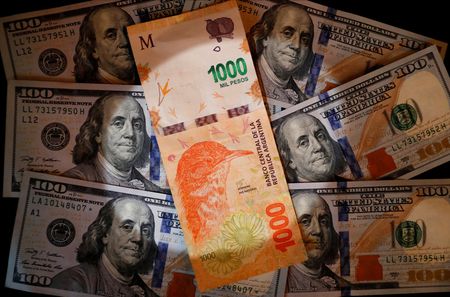 1
1 1
1
By Jorge Otaola
BUENOS AIRES (Reuters) -Argentina’s central bank hiked its benchmark interest rate a huge 10 percentage points to 91% on Thursday as it tries to tame high inflation and steady the peso currency, which has tumbled in black market trading over the last week.
The hike, the biggest since a market meltdown in August 2019, comes after the central bank (BCRA) had already lifted the rate last week by 300 basis points to 81% in an effort to control inflation running at 104% annually.
The central bank confirmed the hike in a statement after Reuters earlier reported the move, citing bank sources.
News of the sharp hike lifted the peso currency in the black market, which strengthened 1.5% to 462/467 per dollar on Thursday, although it was still over 100% off the official exchange rate of 222 per dollar.
A higher interest rate offers more incentives to savers to keep their funds in pesos, strengthening the local currency, but weighs on borrowing and economic growth.
In a statement the bank said it had raised the benchmark rate to shift toward “real returns on investments in local currency” and to promote savings in pesos. The 91% rate would apply to fixed-term 30-day deposits of up to 30 million pesos.
“The BCRA will continue to monitor the evolution of prices, the dynamics of the financial and forex markets, and monetary aggregates in order to calibrate its rates policy,” it said.
‘PROMISING, BUT LATE’
Analysts cheered the move, though cautioned that it was only a bandage for Argentina’s many economic woes.
The major global grains and beef supplier is battling inflation that topped 104% in March, with analysts predicting prices will rise this year by some 110% to 130%. The peso currency is also quickly losing value against the dollar.
“The rate increase is a promising measure, but late,” said Sergio Chouza from the Sarandi consultancy.
Analyst Leonardo Chialva said the move would be a “patch” that could bring calm to the markets for now but would not fix the root issues, especially with the government under pressure to spend ahead of general elections in October.
“The underlying problem is the fiscal one, and the cure needed is difficult to pull off in an election year,” Chialva said.
The South American country has a $44 billion loan program with the International Monetary Fund (IMF), which includes targets to have a positive real interest rate, rein in inflation and build up its scant foreign currency reserves.
(Reporting by Jorge Otaola; Writing by Adam Jourdan; Editing by Jonathan Oatis and Rosalba O’Brien)